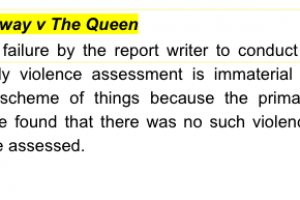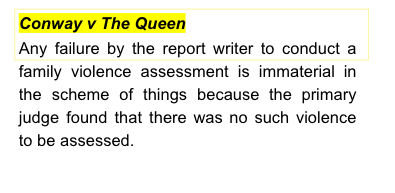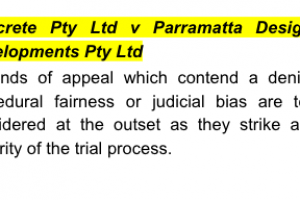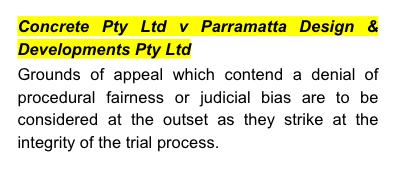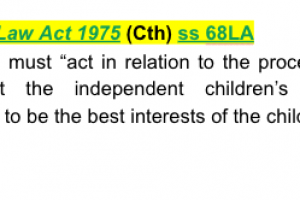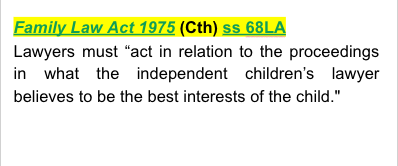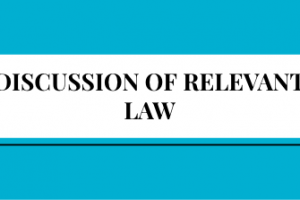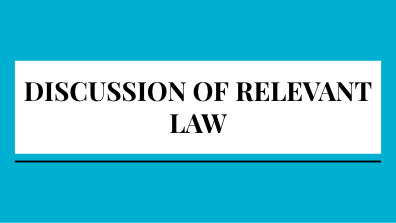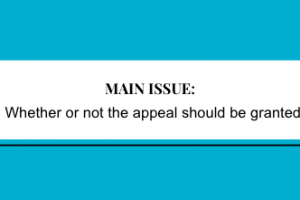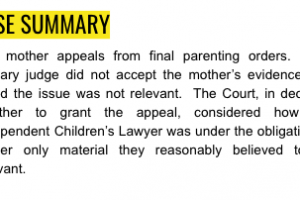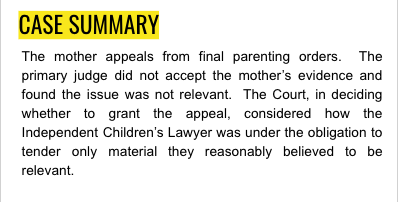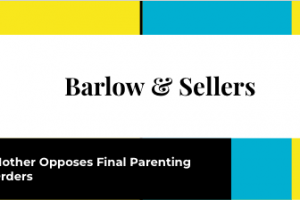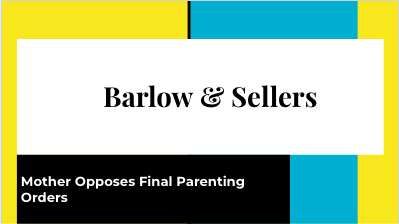- · 4701 friends
Mother Opposes Final Parenting Orders

Barlow & Sellers (No 3) [2022] FedCFamC1A 105 (13 July 2022)
The mother appeals from final parenting orders. The primary judge did not accept the mother’s evidence and found the issue was not relevant. The Court, in deciding whether to grant the appeal, considered how the Independent Children’s Lawyer was under the obligation to tender only material they reasonably believed to be relevant.

Facts:
Ms. Barlow (“the mother”) and Mr. Sellers (“the father”) have two children who were born in 2010 and 2012. The orders provided for both children to live with the father who was to have sole parental responsibility for them. The children were to have limited time via Skype with the mother and no face-to-face time. The mother was restrained from attending at or approaching nearer than 100 metres of the children’s school (unless invited to a parent/teacher interview by the principal or the class teacher) and restrained from attending nearer than 100 metres of the father’s church from 15 minutes before any advertised service until 15 minutes after the conclusion.
Orders were also made for the father to keep the mother updated of the children’s schooling and health, and where the mother chose to attend therapy, to provide the relevant reasons for judgment and Family Report to the therapist. The mother appeals against these orders. The parties commenced a relationship in late 2009 and separated in September 2012. The mother commenced proceedings on 19 September 2012.
Final orders were made by consent on 9 October 2013, but on 21 November 2013 the mother stopped complying with them. On 18 February 2014, the mother filed an application seeking to suspend the children’s time with the father. On 5 April 2018, his Honour made orders which provided for the parties to have equal shared parental responsibility and for the children to live with the mother and spend significant and substantial time with the father. The mother filed a further Initiating Application on 23 October 2018 seeking orders that the children spend no time with the father, but filed a Notice of Discontinuance on 16 January 2019.
The father filed an Initiating Application on 15 February 2019 seeking orders that he have sole parental responsibility for the children and that the children live with him and spend significant and substantial time with the mother. On 16 March 2019, the Department for Child Protection (“the DCP”) removed the children from the care of the father, with whom they were spending time pursuant to the orders made on 5 April 2018. The children were placed in the care of the mother and were not to see the father. The DCP appeared in the proceedings on 9 July 2019 and informed the Court that it no longer had any objection to the children spending time with the father.
Interim orders were made by the primary judge on 27 February 2020 and 13 March 2020 which had the consequence that the children were to live with the father from 27 February 2020 until the final orders were made. The mother’s case at the final hearing was that the father posed a risk of sexual harm to the children and that he was violent. The primary judge did not accept these contentions. Findings were made that the mother “did not promote the children’s relationship with the father."

Issue:
Whether or not the appeal should be granted.

Applicable law:
Family Law Act 1975 (Cth) ss 68LA - provides that lawyers must “act in relation to the proceedings in what the independent children’s lawyer believes to be the best interests of the child."

Concrete Pty Ltd v Parramatta Design & Developments Pty Ltd (2006) 229 CLR 577; [2006] HCA 55 - provides that grounds of appeal which contend a denial of procedural fairness or judicial bias are to be considered at the outset as they strike at the integrity of the trial process.


Analysis:
The mother says that the evidence showing the denial of procedural fairness is to be found in the transcript, in the way the trial was conducted and due to the lengthy delay in between the hearing dates and the orders being made. Although the delay is not ideal, the mother did not point to any practical injustice which resulted from it or suggest that the reasons should be subject to greater scrutiny.
No further details or examples were provided in support of how the trial was conducted in an unfair way. The mere fact that the primary judge made a set of interim parenting orders on 27 February 2020 and 12 November 2020 does not mean that her Honour did not bring an open mind to bear on the question of what orders were appropriate to be made on 20 December 2021.
There is no suggestion that the mother sought the disqualification of the primary judge at any time after 12 November 2020. In the absence of the transcript, the Court is unable to deal with the submission that the mother was improperly prevented from asking questions. The conduct of the ICL cannot bear upon impartiality of the primary judge.
The low level of Condition FF from which the father was found to suffer did not significantly impact on his ability to care for the children. The primary judge did not simply discount the children’s wishes because they were autistic, but having regard to their age and their maturity and ability to understand the complex issues before the Court, her Honour considered that their expressed wishes could not be seen as a “strong [determinator] of the outcome”.
Conclusion:
The appeal is dismissed. The father sought an order for costs on the grounds that the appeal had been wholly unsuccessful, but having regard as to the mother’s financial position, the Court is satisfied that it is just in all of the circumstances that there be no order as to costs.


